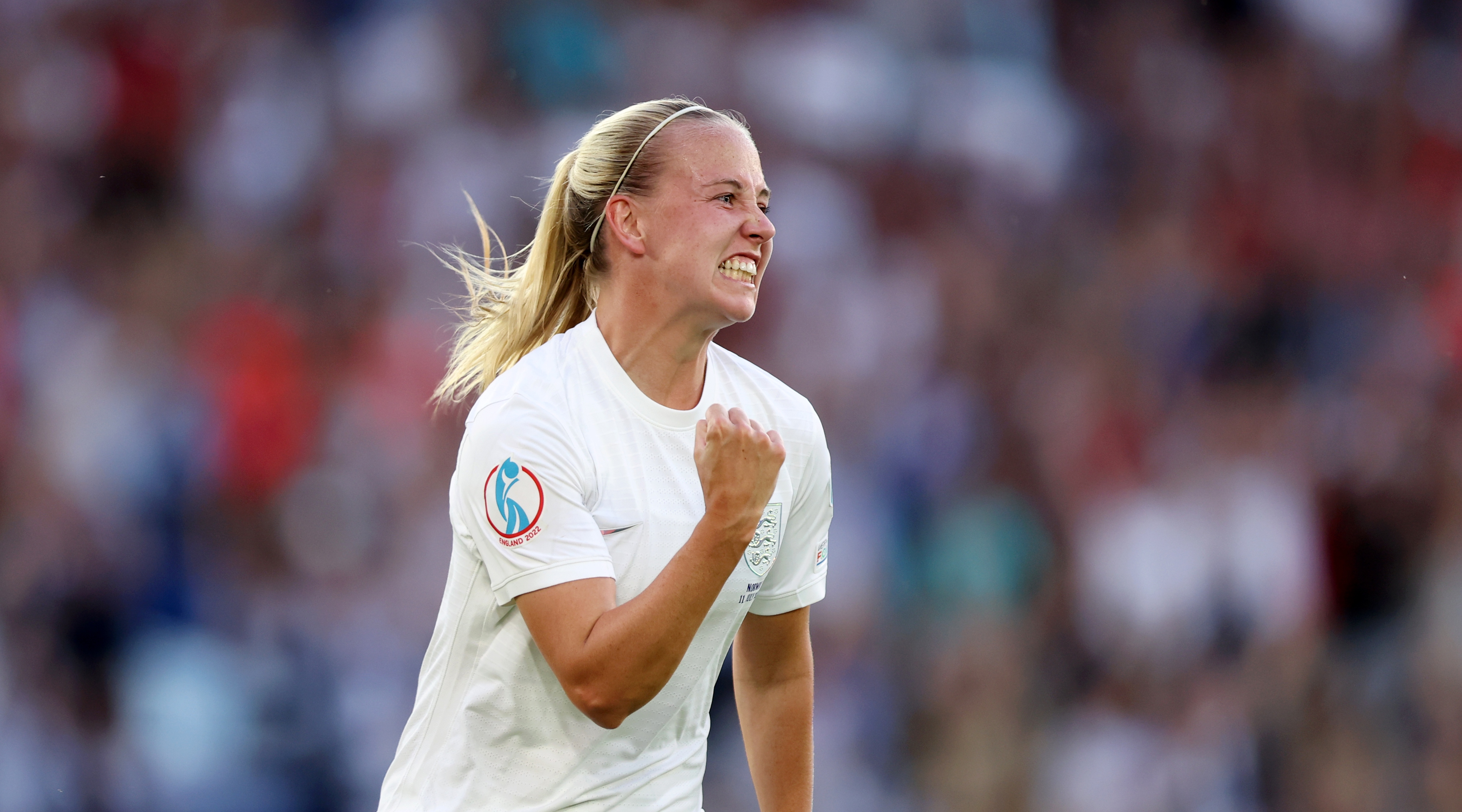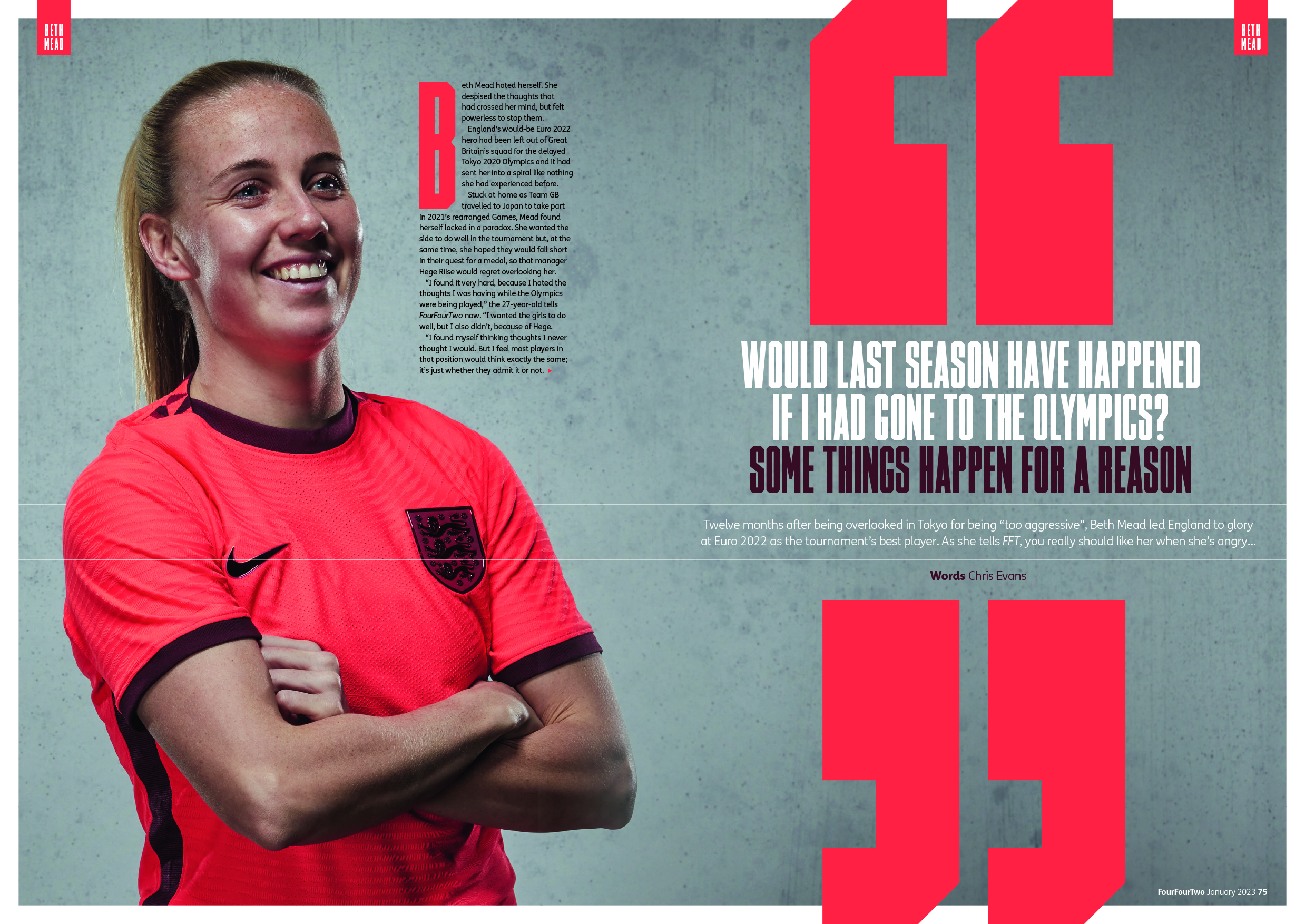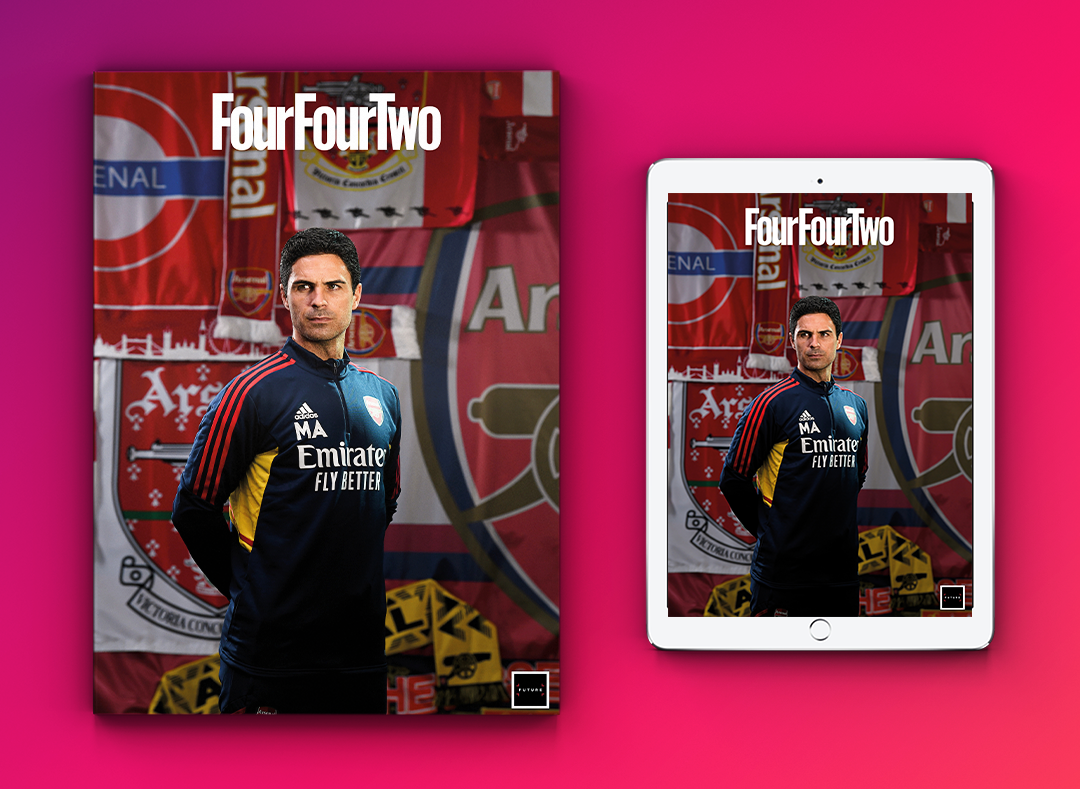England's Beth Mead: 'I wanted to stop being a brat – I'm not the only striker to be pushed out to the wing'
Arsenal's Beth Mead won Euro 2022 with England in the summer, and has now landed BBC Sports Personality of the Year. She tells FourFourTwo how she reached the top of her game

Beth Mead hated herself. She despised the thoughts that had crossed her mind, but felt powerless to stop them.
England’s would-be Euro 2022 hero had been left out of Great Britain’s squad for the delayed Tokyo 2020 Olympics and it had sent her into a spiral like nothing she had experienced before.
Stuck at home as Team GB travelled to Japan to take part in 2021’s rearranged Games, Mead found herself locked in a paradox. She wanted the side to do well in the tournament but, at the same time, she hoped they would fall short in their quest for a medal, so that manager Hege Riise would regret overlooking her.
“I found it very hard, because I hated the thoughts I was having while the Olympics were being played,” the 27-year-old tells FourFourTwo. “I wanted the girls to do well, but I also didn’t, because of Hege.
“I found myself thinking thoughts I never thought I would. But I feel most players in that position would think exactly the same; it’s just whether they admit it or not.
“Reflecting on it now, how I felt was quite normal under the circumstances. There was no malice towards anyone else who was part of that team. But it was tough.”
NEWS Beth Mead wins BBC Sports Personality of the Year award after an incredible 2022
Get FourFourTwo Newsletter
The best features, fun and footballing quizzes, straight to your inbox every week.
In truth, it wasn’t a big surprise that Mead hadn’t been selected. Riise had overlooked the forward for a couple of previous England squads while the Norwegian doubled up as Lionesses interim and Great Britain manager before Sarina Wiegman’s impending arrival in September 2021 – not that it made the rejection any easier for Mead.

To escape those dark feelings, the Arsenal forward took her mind off what was going on in Japan, taking only a passing interest in the Olympics and busying herself with trips to watch the men’s European Championship and Wimbledon tennis tournament.
But even as Team GB lost 4-3 in extra time to Australia in an epic quarter-final tussle, she bristled with frustration at the thought of how she could have made a difference.
As the new 2021-22 season began, Mead had a choice. Instead of letting anger and injustice consume her, she channelled both as motivation to prove her doubters wrong.
A little over a year later, she was the toast of the nation. Mead smashed six goals and assisted five en route to winning the Golden Boot and Player of the Tournament awards as England lifted the European Championship trophy, the country’s first major title – men’s or women’s – since 1966 and all that.
She obliterated Jimmy Greaves’ 13-goal single-season scoring record for England, set back in 1960-61, by plundering a scarcely credible 20 in 2021-22, including four hat-tricks.
To top off her annus mirabilis, she came second in the 2022 Ballon d’Or Feminin and UEFA Women’s Player of the Year rankings behind Barcelona’s Alexia Putellas, before winning the BBC Women’s Footballer of the Year prize.
Point proved, then. Now Mead can reveal not just the why, but the how.

Mead is no stranger to blocking out the naysayers, though. Growing up in Whitby, North Yorkshire, the football-mad adolescent was used from a young age to being the subject of ridicule. Her crime? Being a girl in a junior league almost exclusively made up of boys.
Every weekend as she fastened her boots, the small girl with long blonde hair naturally stood out. Mead more than held her own on the pitch, but that didn’t stop a deluge of disparaging comments and jokes being made within her earshot – and her dad’s.
“As a kid, you think less and you don’t worry about all of the outside noise,” she tells FFT. “When I heard boys or parents laughing on the side of the pitch as I came on, I knew that I had the full belief of my team-mates, their parents and my parents.
“My dad told me that some people will always have opinions, and that I would hear a few things, but he said, ‘You don’t need to say anything, Beth, and neither do I – your football will do the talking’.
"After most games, I’d earned a lot of respect from teams and from parents for getting stuck in and playing well. Just because I was a girl running around with a ponytail didn’t make me any different to those boys.”
If having thick skin is a prerequisite for Mead, then so is her passion for the sport.
It would have been easy for the childhood Manchester United fan to stick to watching football and instead pursue one of several other sports she tried as a youngster. Yet, while ballet classes, cross-country running, netball and hockey may have offered her the opportunity to consider other activities, they didn’t really compare.
“I tried a lot of sports and enjoyed being active and joining in different things, though football always hit me different,” says Mead. “I loved what I was doing on the pitch and had no other worry in the world – nothing else mattered except me kicking that football.
“That’s still my way of switching off now: just running around on a football pitch and loving what I’m doing. That’s never changed, from the six-year-old kid to the 27-year-old who’s running around now.
“Football is my first love; my one true love. It still breaks my heart sometimes, but that’s part and parcel of the game.”
The fruit of Mead’s love was goals. After joining up with local team California Girls, the 10-year-old hotshot couldn’t stop finding the back of the net. It wasn’t too long before she had caught the eye of Middlesbrough’s Centre of Excellence, where the scoring continued.
It required a 45-minute drive along country roads to reach Boro’s academy from home, but accompanied by her dad’s cassettes playing Madness, Queen and The Clash, the journeys would fly by. It was a good job, too, because as Mead turned 16, those trips were only going to get longer, due to Sunderland showing an interest in recruiting the young striker to their programme.
The Black Cats had a strong reputation for developing young female players in the region, but an initially reticent Mead needed some convincing from her parents to move out of her comfort zone. She would be leaving age-group football in order to play in the senior team – a teenager finding her way among adults.
“I was very lucky that I had my mum and dad, who always pushed me past my limits to the point they made me better,” explains Mead. “If I had made those decisions, I may have held myself back.
“I went up to Sunderland and then started to play with women as a 16-year-old, but they were great with me and made me feel so welcome. I remember one game when
I got absolutely clattered: they all ran round and protected me as if I was their kid sister, which was instantly a comfort.”
The goals kept flowing. Mead finished her first campaign at Sunderland with 29 in all competitions as she clinched the second-tier Women’s Premier League National Division Golden Boot, before raising the bar higher still the next year with 30 goals in 28 games.
Mead’s exploits were getting noticed, and not just in the women’s game. When another prolific goalscorer moved to the Stadium of Light in 2015, he was keen to find out more about the teenager who was earning all of the plaudits on Wearside.
“Jermain Defoe was amazing with me,” says Mead with a smile as she looks back at her meeting of minds with the ex-England hitman. “We were lucky to share breakfast and lunch in the same canteen as the men’s team, which was very nice – it’s something Sunderland got right from day one.
“He literally waited for me every morning. He heard about me being this great striker, so he wanted to know everything about me because he wasn’t the only great striker at Sunderland at the time. We got on really well, talking about football every morning while he had a green tea.
“He had watched a few of my goals and said, ‘I’ve never scored one like that before – what were you thinking when you did that?’ I would always explain, but he understood that strikers have to be quite instinctive in things you do.
“We’re quite similar characters in a sense – we’re quite outgoing and extroverted. We bounced off each other. We stay in touch to this day, and he’s always supported me and shared his experience to help me with what I’m doing in my career.”
For all of Defoe’s guidance, though, his own links to north London might have meant he didn’t approve of Mead’s next big decision.
Arsenal are the most successful English club in the women’s game and represented a move to the big time for Mead, who had continued to tear apart defences even after Sunderland won promotion from WSL2 into the top division for the 2015 season. Yet the striker’s initial answer was no.
Rather than make the long move south, she decided to remain in the North East for another campaign, turning professional with Sunderland for their first season in the newly formed WSL1. She also completed the final year of her sports development degree at Teesside University.
“It was a gamble, to say the least,” recalls Mead. “It was a tough decision – one I sat down and talked to my mum and dad about. It wasn’t a case of getting out of my comfort zone at the time, because I knew the quality of players that Arsenal had.
"I hadn’t had any exposure to WSL1, so I thought it was more important to be playing regularly in the top league, and I’d get more of an opportunity to do that at Sunderland than Arsenal.”
Mead’s decision was proved emphatically right. Despite suffering a car accident midway through the campaign when she swerved to avoid a deer, the 20-year-old registered 12 goals in 14 league games to top the scoring charts in her debut top-flight season. Her dozen strikes included a goal in both games against the Gunners, which kept her firmly on the radar of Arsenal’s Spanish manager Pedro Martinez Losa.
So, it was no surprise when Martinez Losa got in touch with Mead again at the end of the following campaign to see if she would reconsider joining the north Londoners. This time, in January 2017, Mead’s reply was yes.
The honeymoon period didn’t last long, though. Within months of joining Arsenal, Mead was shifted out to the wing as Dutch goal sensation Vivianne Miedema arrived from Bayern Munich.
Despite Mead’s initial dissatisfaction at having to learn a new position, Miedema’s acquisition proved to be significant. The duo eventually hit it off – on and off the pitch. The pair are now dating, while the positional switch reawakened the resilience that has become the England forward’s calling card.
“I wanted to stop being a brat, because I’m not the only person it happens to,” says Mead, of being asked to play in a different position for the benefit of the team.
“I’d been a No.9 for most of my career, and then I was pushed out to the wing because another No.9 came in. I was like, ‘I’ve scored as many goals as her this year’. It felt a bit unfair – but it was another one of those life lessons.
“I was given my first England cap because I could play on the wing. It brought different elements to my game, and I’m effective as a winger because I understand from my own experience what a No.9 really wants.
"There are pros and cons to every situation. I’m very much about having a positive outlook on bad situations now, and I made good on what I felt was a bad situation. I worked extremely hard and tried to nail down the position that I still play today.”
Inside 12 months, she was summoned to be part of Phil Neville’s England squad for the 2019 World Cup qualifiers and came off the bench to make her debut in a 0-0 draw with Wales. The moment had been years in the making and made up for the forward’s only previous call-up, in 2015, when she felt she was an afterthought in the plans of Neville’s predecessor, Mark Sampson.
Neville saw Mead as anything but a bit-part player. The former Manchester United and Everton utility man quickly identified how to get the most out of his new star.
Part of Neville’s plan for Mead to reach her potential was to harness her energy and aggression, key components of her game. Victory at the 2019 SheBelieves Cup – which included an angled match-winning strike from Mead to defeat Brazil – and a last-four spot at the World Cup suggested things were on the right path.
However, following England’s agonising semi-final exit to the United States, a sharp downturn in form of seven reverses in 11 games spelled the end for Neville in January 2021 – his temporary replacement, Riise, then turned Mead’s world on its head when she branded the winger as “too aggressive” and left her out of that summer’s squad to compete for Olympic gold.
“That’s what I struggled most with,” says Mead, whose mother was diagnosed with cancer at around the same time.
“To this day, I get told that my aggression can be the best part of my game and to use it in the right manner on the pitch, so to be told that [by Riise] was the opposite.
“Phil [Neville] always told me he wanted to annoy the hell out of me before every game so that I’d run on the pitch and be an angry person; for the next manager to come in and tell me I was too aggressive... I struggled to take that. I struggled to understand it. It was a frustrating one, to say the least.”
The injustice lit a fire beneath Mead.
“It wasn’t the fact that I wasn’t selected; it was the non-clarity and poor decisions behind that,” she continues, fixing her gaze dead ahead. “But it happened, and maybe, looking at the season I just had, would that have happened if I’d gone to the Olympics? Some things happen for a reason.”
Mead’s numbers throughout the 2021-22 campaign would have been impossible to ignore. She had 19 goal involvements in the WSL, with 11 goals and a league-high eight assists as Arsenal finished second; they were the only English side to reach the Champions League quarter-finals. Even more impressive were her underlying stats, topping the WSL charts in several creativity metrics including key passes, big chances created and shot-creating actions per 90 minutes.
Mead was flying by the time the England squad came together for Euro 2022, having scored 14 international goals already that season before the tournament kicked off.
“As a confidence player, it helps to hear nice things sometimes,” she says, smiling. “You want to be perfect as a footballer and it’s never going to happen, but you can push yourself to be the best you can be. I knew I had more to give, and in the season just gone I performed more consistently rather than having good matches here and there.
“I just felt great during the tournament and was loving what I was doing, which showed out on the pitch. When you get opportunities in front of goal, it doesn’t always happen, but this tournament it seemed to happen and the chances kept going in the back of the net – I’m incredibly grateful.”
It took only 16 minutes for the Lionesses’ leading light to notch the opening goal of the tournament, grabbing the winner at Old Trafford in the hosts’ curtain-raiser against Austria, which Mead describes as the side’s “most nervous game”. Even though they won only 1-0, it set the tone for the competition.
England followed that narrow victory with another 13 goals in their next two group games: an extraordinary 8-0 demolition of Norway in which Mead bagged a hat-trick, then a 5-0 win against Northern Ireland in which she added another goal to her tally.
Opponents became considerably tougher in the knockout stages.
“We had quite a hard run,” says Mead. “We played Spain [in the quarter-finals] who are an unbelievable team in possession and very hard to get near, so I knew it was going to be hard. Another year, we could easily have crumbled at 1-0 down. This time, we had full trust and understanding in each other as a team, and we knew we were capable of doing and giving more. And that we did.”
Ella Toone’s equaliser and then Georgia Stanway’s extra-time rocket sealed a brilliant England turnaround. In the semi-finals they had another shaky start, yet Mead was
on hand to settle the nerves again by scoring the opener in a 4-0 victory against Sweden.
The country was at fever pitch, especially with the prospect of facing Germany in the showpiece, but Mead explains that manager Sarina Wiegman made the difference with her ability to not let that affect the players.
“I don’t know how she does it – we think she’s a genius,” beams Mead. “She has such an effect on you as a person and as a team. She’s direct: you know where you stand, you know your responsibilities, and you know the way we play as a team.
“Throughout the Euros, she kept us humble and out of the limelight, keeping us in our family bubble of the team. She made us feel calm even though everywhere else was so pumped and excited.
“Even in the changing room ahead of the final, she told us, ‘We don’t have to win but we really want to, and today is just another game of football, though of course it has a lot riding on it. We’re playing a game that we love and we have to go out and enjoy it the best we can’.”
For once, it wasn’t Mead who hogged the headlines. Having come off with a dead leg shortly after Toone had given the Lionesses a second-half lead, Mead had to watch the rest of the final from the bench as Germany equalised to force extra time – and as her replacement, Chloe Kelly, netted the decisive goal with less than 10 minutes remaining.
“It was shocking – I’m not good at being on the sidelines and sitting on the bench,” says Mead, laughing. “When Chloe’s goal went in, it was if my dead leg was instantly healed – I jumped over the barriers and went on to the pitch to celebrate with her.
"From then on, every time Germany got past the halfway line, I was very nervous and edgy.”
When the final whistle sounded, the party could get started.
Mead had been propelled into the world’s attention, picking up her personal accolades before getting her hands on the European Championship trophy.
Being recognised by fans has become commonplace, with TV appearances and interviews turning her into one of the country’s most recognisable footballers – even if she was unfortunately captioned as partner Miedema’s ‘guest’ on the Ballon d’Or red carpet.
Mead soon learned the pitfalls of being well-known, though: an innocent holiday walk abroad descended into a swarm of selfie-hunters wanting to secure a shot with England’s latest national treasure. Life has changed.
From that ordinary little girl with a blonde ponytail who had to ignore the sniggers of her opponents just to play the game she loved, Mead is now on top of the world. She’ll fight back from a serious knee injury suffered in late November, too. It’s what she does.
“This year, I just stripped everything back,” she concludes. “We speak about pressure on people, but six-year-old Beth played football because she loved playing football, so why shouldn’t 27-year-old Beth do that as well?”
We could all learn from that lesson.

Chris Evans is a freelance journalist and has been a regular FourFourTwo contributor since 2014, covering a wide range of stories up and down the football pyramid. Chris's work has also appeared in the Guardian, the Independent and other national newspapers, as well as on the BBC Sport and Mail websites. He is also the author of two books for Bloomsbury Sport, How to Win the World Cup: Secrets and Insights from International Football's Top Managers in 2022, and Gary Lineker: A Portrait of a Football Icon, which was published in 2025.
